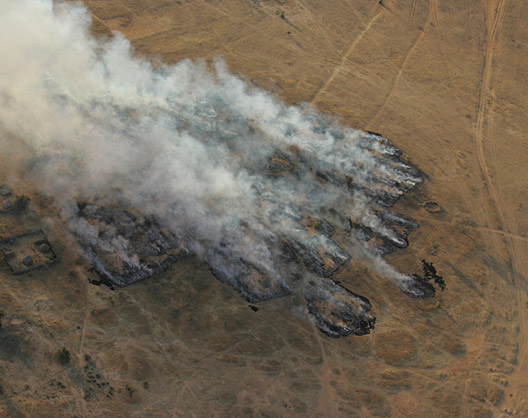I had the opportunity this semester to take a class on Warlords and Non-State Actors this semester, and jumped on it. The first class on the Taliban was a bit of an eye-opener, at least for me. Thanks to the Iraq War (which is, frankly, over at this point), I've been relatively happy to blissfully ignore the New Quagmire for a more geopolitically interesting situation. Since Professor Christina yanked me out of my cave, I've learned a few things about Afghanistan that I want to share with you.
One of the interesting studies she presented was a survey of 42 Taliban in Kandahar (somewhat non-scientific, but rather compelling nonetheless, particularly that it was conducted by a Pashtun) that revealed a bunch of interesting tendencies about the Taliban. The first is that they're so thoroughly propagandized by Talibani leadership that literally all 42 interviewed believed that NATO was specifically designed as a Western coalition to attack Muslims. Most of these guys were also pretty bent on putting down their arms and getting back to work once the "foreginers" were driven out--sadly, this probably also includes toppling the Karzai regime, as he's seen by Talibani as a puppet of the West. The last interesting observation is that these guys really have no connection to Al-Qaeda anymore--or at least not much of one. Al-Qaeda was a client of the Taliban, but the Taliban doesn't need them, and shed them when Al-Qaeda became too costly to hold on to (a sign that some aspects of the Global War on Terror are going well).
So let's take a look at ethnicity in Afghanistan. Remember the Northern Alliance? That was a bunch of Turkmen, Tajiks, and Uzbeks. If these names sound familiar, it's because they each have a majority Central Asian country (Turkmenistan, Tajikistan, and Uzbekistan). During the invasion, they drove south, and wiped the Taliban, who were mostly Pashtun.
But they kept their heads down, and came back. Look first at the ethnic groups; the brown area...

Now, on this graphic, see the green area; this is the Pashtun-dominated area in both Afghanistan and Pakistan.

And finally, look at the dark red areas in the map below; there you see "high Taliban presence," along with the red dots that indicate their attack patterns in 2007. As you'll notice, it's pretty clearly in Pashtun areas (and Baluchi areas and some Tajik areas). But Pashtuns, the clear plurality (and they think majority) of Afghanistan are the biggest problem. They're now a bunch of militants that are trying to drive out the US and re-establish the Sharia nutjob state that ran the show until 2001. And, of course, Afghanistan is always going to have some of these guys, and one either has to deter them, kill them, or drive them out (becuase one won't convince them). But this huge proportion of the population has been convinced to at least help out the Taliban, and this is in part due to ideology, in part due to the fact that the government cannot provide administration and security, and in part because the Taliban has coerced them through terror (they are very good at sending letters with lots of creepy details that convince everyone that they are watching at all times).

For whatever reason, these guys feel marginalized by the new government. And while a bunch of folks would be happier to buy into the government and just live their lives, the Taliban has made defection so deadly (and seemingly have eyes everywhere) that a lot of people are trapped in fighting for the guys they don't want to. So how do we separate them? Well, that's tough. But, essentially, we need to do 3 things, simultaneously: 1) provide sufficient protection to our quiet supporters such tha they can support us, 2) convince the fence-sitters (with economics!) to join our side, and 3) deter/kill/beat down the "irreconciliables."
So this actually looks a lot like the Surge strategy. It's going to require (if we throw a bunch of troops at the problem) getting into every darn village in the south, and getting our chins pretty bloody for quite a while. It is going to require undercover agents, competent translators (and lots of them), and lots of training for Afghan troops to make them ready enough to join the US on missions. Joint Afghan/US missions in large numbers will not only train Afghan troops in COIN, but also help give the US some legitimacy, tact, and context in its own missions.
But Afghanistan has become more than just a fight against a few terrorists. It did years ago, but it took us a while to admit it or get our heads around it. We're dealing with a sustained militia resistance, one that is largely bent on Islamic rule and largely bent on booting foreigners. Really, we should be negotiating with the Taliban and trying to give the majority of them sufficient buy-in to jump on the Karzai boat. This requires both increasing the benefits of joining, and increasing the costs of resisting (which requires continuing to bloody them, cut off their access to money, etc).
This is all fine and well, and would likely be achieveable in Afghanistan if it weren't for the fact that some 40% of the Taliban is across the border. One simply can't solve this problem in the long term as long as the Taliban can fester unmolested in Northwest Pakistan. And really, that's the most frustrating part about Afghanistan, whenever one thinks about it. We can have a great plan, but as long as we can't march into Pakistan and work together with the local troops there, it's going to be a waste of time. I'm excited to see what Petraeus can pull out of his pocket, because the man's brilliant. But it may be an impossible task, because there are too many variables, too many people, and too many square kilometers that aren't in his control at all.
So, we'll see. Sadly, I don't have much of an answer except to go ahead with a Surge-style boots-on-the-ground strtategy, and see if we can't convince a bunch of Taliban-turned-good-guy militias to cross back into Pakistan and do our dirty work for us.
 Kadima's gamble in Palestine did not pay off. It's unclear as to whether or not it backfired, but Feb. 10th elections have given Israel's right-wing a majority presence, and President Peres has asked Mr. Netanyahu to form a government, despite Likud's second-place showing in the election.
Kadima's gamble in Palestine did not pay off. It's unclear as to whether or not it backfired, but Feb. 10th elections have given Israel's right-wing a majority presence, and President Peres has asked Mr. Netanyahu to form a government, despite Likud's second-place showing in the election. Netanyahu will have to appeal to the Zionist/Nationalist tendencies of many right-wing groups, including Yisrael Beytenu (15 seats), United Torah Judaism (5 seats), National Union (4 seats), The Jewish Home (3 seats). Shas (11 seats) is the wildcard--but even if Netanyahu picks them up, he has a narrow coalition indeed, and one whose weight is far to the right. Voices interested in a two-state system will be sidelined in this new government, and the Palestinian Authority will have to choose a reaction.
Netanyahu will have to appeal to the Zionist/Nationalist tendencies of many right-wing groups, including Yisrael Beytenu (15 seats), United Torah Judaism (5 seats), National Union (4 seats), The Jewish Home (3 seats). Shas (11 seats) is the wildcard--but even if Netanyahu picks them up, he has a narrow coalition indeed, and one whose weight is far to the right. Voices interested in a two-state system will be sidelined in this new government, and the Palestinian Authority will have to choose a reaction.








